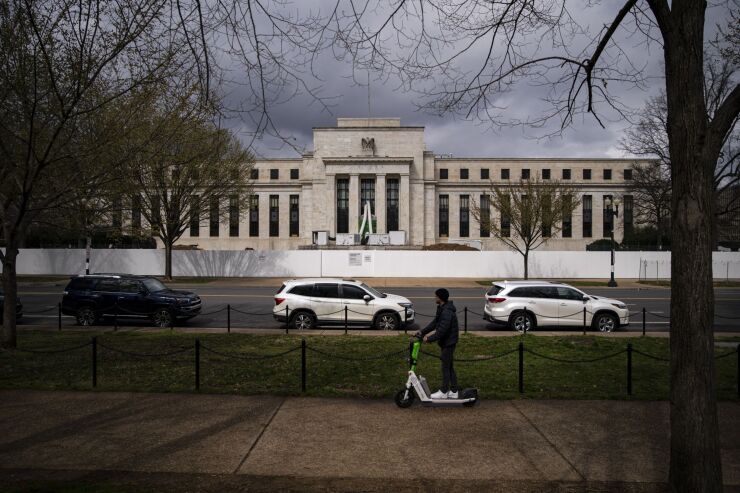
WASHINGTON — Banks and business trade groups sued the Federal Reserve board on Tuesday, demanding that bank capital requirements go through a rigorous notice-and-comment rulemaking process.
The lawsuit, filed in an Ohio court, comes just a day after the Federal Reserve had sought to stave off the lawsuit by
The groups said the changes would address "some if not all" of their concerns, but they filed the lawsuit under the Administrative Procedures Act to "preserve their legal rights and to ensure timely reform to the current, flawed process."
The groups — the Bank Policy Institute, the American Bankers Association, the U.S. Chamber of Commerce and two local Ohio trade organizations — said that they don't oppose stress capital buffer requirements, or the test to determine them.
"On the contrary, Plaintiffs support such a buffer and the appropriate use of stress-test results to determine it," the groups said in the complaint. "Nor do Plaintiffs seek to upend banks' capital requirements or to disrupt the Board's application of the stress tests. Instead, Plaintiffs bring this lawsuit to help ensure that beginning in 2026, the Board subjects the components of the stress tests to public notice and comment and complies with other applicable legal requirements."
Every year when the Fed conducts the stress tests, the board chooses a hypothetical set of economic conditions and uses internal models to project how banks would perform under those circumstances.
"Adopted in secret, it produces vacillating and unexplained requirements and restrictions on bank capital," the groups said.
The Fed does not disclose, for example, details about its internal models, and it makes changes to the tests every year.
"The opaque nature of these tests undermines their value for providing meaningful insights into bank resilience," Rob Nichols, president and CEO of the American Bankers Association, said in a statement.
The Fed declined to comment on the lawsuit.
While the lawsuit is based on the Administrative Procedures Act, it highlights the growing influence of a June Supreme Court decision in Loper Bright Enterprises v Raimondo that eliminated judicial deference to regulatory agencies known as
The Fed referenced evolving attitudes toward agency rulemaking in its announcement on Monday.
"The framework of administrative law has changed significantly in recent years," the Fed stated. "The board analyzed the current stress test in view of the evolving legal landscape and determined to modify the test in important respects to improve its resiliency."
The Fed said it plans to disclose the models it uses to estimate hypothetical banks losses and revenues under the stress scenarios and to allow public commentary on them. It will also consider averaging results over a two-year period to even out some volatility of resulting capital charges.
Fed Gov. Michelle Bowman called for similar changes in a
"It is important that regulators consider the lessons learned from past tests and feedback from banks and other members of the public to ensure that stress testing is fair, transparent and more useful going forward," Bowman said in September.
The changes also follow remarks from Rep. Andy Barr, R-Ky., a leading Republican on banking issues in the House Financial Services Committee. He led a subcommittee hearing in June on the topic.
"Instead of running stress tests in an open and accountable manner, subject to public scrutiny, the Federal Reserve cloaks the stress tests under a veil of secrecy," Barr said at the hearing. "This is no legal basis for this secrecy, and the perceived benefits of secrecy are illusory at best."
Kate Berry contributed to this article.





